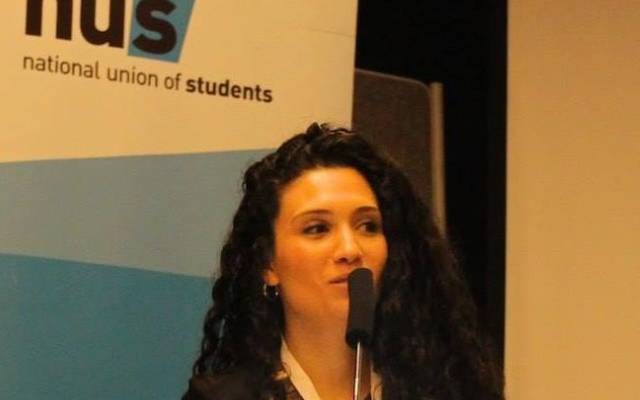Malia Bouattia, who was elected president of the National Union of Students (NUS) in the UK on Tuesday, is facing criticism from Jewish students over controversial remarks about Israel.
Bouattia, who is of Algerian origin, won the election on the first round of voting against the outgoing NUS president, Megan Dunn.
In an article she co-wrote in 2011, she referred to the University of Birmingham as a “something of a Zionist outpost” and referenced the Jewish Society when describing the challenges she faced at university.
At a recent event in London, she blamed the existence of a “Zionist lobby” for failed government policies.
In a 2014 video, Bouattia can be seen as endorsing armed struggle while condemning what she calls “mainstream Zionist-led media outlets”. She also claimed that “Zionist-led media” oppressed the global south and lent her support to the “resistance” even if this resistance took a violent form. She also condemns the Israel-Palestinian peace process as “strengthening the colonial project.”
According to the UK’s Daily Telegraph, Bouattia was congratulated on her election by the extremist group Cage, which also denies terrorism and last year defended the Islamic State (ISIS) executioner known as Jihadi John. Bouattia works closely with Cage and has shared platforms in British universities with its head of outreach, the former Guantanamo inmate Moazzam Begg, at least six times in recent months, the newspaper reports. Cage’s role in the NUS was a key issue in the presidential race.
Dunn, the defeated incumbent, said that the NUS would “not work with Cage,” which the NUS describes as a “deeply problematic organization” whose leaders “have sympathized with violent extremism and violence against women.”
Last week, Bouattia rejected the allegations of anti-Semitism, but said her anti-Zionist stand was legitimate. In an open letter, she wrote: “I do not now, nor did I five years ago when I contributed to the article cited in your letter, see a large Jewish Society on campus as a problem. I celebrate the ability of people and students of all backgrounds to get together and express their backgrounds and faith openly and positively, and will continue to do so.”
“I want to be clear that for me to take issue with Zionist politics is not me taking issue with being Jewish. In fact, Zionist politics are held by people from a variety of different backgrounds and faiths as are anti-Zionist politics. It is a political argument, not one of faith.”
“I am deeply concerned that my faith and political views are being misconstrued and used as an opportunity to falsely accuse me of antisemitism, despite my work and dedication to liberation, equality and inclusion saying otherwise.”
Jewish Students Voice Concern
The Union of Jewish Students said in a reaction to Bouattia’s election as NUS head: “Now that Malia Bouattia has been elected president, we hope that that relationship [with NUS] will be able to continue. There will, however, still be many Jewish students who have not been satisfied with Malia’s response so far to the concerns raised by Jewish students over the last few weeks. Now, knowing the result of the election, these questions still need to be answered.”
Oxford Jewish Society head Isaac Virchis, who signed an open letter questioning Bouattia’s past remarks about Zionists, said: “It is hypocritical of NUS to pass a motion making a commitment to anti-Semitism and then twenty minutes later to elect a president who has problematic views toward Jewish students on campus. NUS Conference has failed Jewish students and can no longer claim to be representative of each and every student.”
Board of Deputies of British Jews President Jonathan Arkush said: “We are deeply concerned by the failure of new NUS President Malia Bouattia to satisfactorily clarify past remarks and associations. There can be no excuse for associating with organizations who have a history of anti-Semitism, equivocating on terrorism or considering Jewish societies on campus as ‘a challenge’.
“Jewish students have as much right to feel safe on campus as anyone else, and as a president tasked with representing the welfare and concerns of all students, Ms. Bouattia must live up to her responsibility and take the concerns of Jewish students seriously.
“We stand shoulder to shoulder with the Union of Jewish Students and demand that our students are enabled to study hard and enjoy campus life, without any fear or intimidation.”
British lawmaker John Mann, the chair of the All-Party Parliamentary Group Against Anti-Semitism, said the NUS “is not doing enough to combat anti-Jewish hatred, and as such is failing in its responsibilities to its members”.
NUS is a confederation of students’ unions. Around 600 students’ unions are in membership, accounting for more than 95 percent of all higher and further education unions in the country.
By: World Jewish Congress
